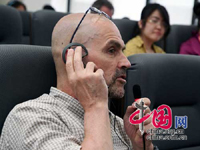活动标题
- Press conference on Olympic medical support system
活动描述
- On May 28, a press conference is held at the Beijing Olympic Media Center. The Beijing Municipal Health Bureau officials brief the media on the Olympic medical support system and answer questions. China.org.cn presents a live webcast of this event.
文字内容:
- Li Zhanjun:
Dear Friends, Good afternoon. Today there are some things to discuss related to the Olympic Games. Welcome to the Press Conference on the Games Time Health Care Systems and Medical Systems and we're honored to have Mr. Jin Dapeng, Party Secretary of the Beijing Municipal Health Bureau (BMHB) and Head of the Medical Support Group of BOCOG; Mr. Zhao Tao, Chief of Disease Prevention and Control Division, BMHB; Mr. Liu Zejun, Director of the Beijing Patriotic Health Campaign Office; Mr. Wang Yi, Chief of the Beijing Municipal Health Inspection Institute; Ms. Chen Jing, Deputy Chief of Medical Services Division, BMHB and she's on the way. And first of all let's welcome Mr. Jin Dapeng to brief you on the health support system of the Olympic Games.2008-05-28 15:00:47
- Jin Dapeng:
Dear Media friends, it is a great pleasure for me to meet all of you with my colleagues such as Mr. Zhao Tao, Wang Yi, Chen Jing, and Liu Zejun. Now we would like to brief you on the Games Time Health and Medical care system.
As you know the Sichuan Earthquake just happened and the Medical team from Beijing on one hand is preparing for the Olympic games and on the other hand is also working for the relief effort. Beijing has sent a team with most medical staff, most medical vehicles with highest professionalism among all the teams sent by different parts of China even this morning we also sent professional teams and more medical staff to Sichuan. This also illustrates a capability of the Medical team. And now I would like to brief you.2008-05-28 15:07:08
- Jin Dapeng:
The multi-faceted goals of the Olympic Health and Emergency System in the Olympic City - using the recent earthquake in Wenchuan as its emergency medical template - has set as its goals nothing less than protecting athletes, coaches, official and spectators from serious infectious diseases during the Olympic Games. Additionally this vast, multi-layered emergency system seeks to ensure that every patient receive timely, effective first aid and medical services.
Staffing for the enormity of the Olympic Games, Beijing municipality has in place the following medical services:
• 24 disease prevention and control institutions;
• 22 sanitary supervision institutions;
• An fully equipped emergency team of 626 disease control staff, and
• 40 emergency squads consisting of 200 sanitary supervision staff2008-05-28 15:09:04
- Jin Dapeng:
Hospitals above third class and intestine clinics of 335 hospitals will immediately report any outbreak of any potential infectious disease through a close-knitted sanitary supervision network of three layers which cover Beijing municipality and integrated urban and rural areas.
By cooperating with the World Health Organization and seven neighboring provinces, autonomous areas and cities, Beijing municipality has established joint defense and joint control mechanism for significant infectious diseases.
2008-05-28 15:12:43
- Jin Dapeng :
Foodstuff contamination supervision networks have been established in eight Olympic related urban areas and drinking water contamination supervision networks have been formed in 18 districts and counties. There is also a global atmosphere radionuclide examination station and an inert gases station established at the Beijing Municipal Disease Control Center.
The two stations operate around the clock to supervise the occurrence of nuclear and radiation accidents or terrorism attacks for Beijing municipality, the nation and even neighboring countries.
2008-05-28 15:14:03
- Jin Dapeng:
It is essential to provide safe, standardized, fast medical services with the assistance of medical teams and hospitals designated by the Beijing Olympic Committee, and clinics in the Olympic Village; and to ensure the security of Olympic stadiums and public health by giving public health protection the first priority; to take timely actions to tackle public emergencies.
2008-05-28 15:14:49
- Jin Dapeng :
To do so, the Olympic Health and Emergency System has established:
• 421 public sanitary safeguard personnel;
• 63 sanitary supervision and safeguard vehicles and 50 sanitary epidemic prevention vehicles assigned to Olympic venues;
• 280 Olympic catering units;
• 31 competition revenues and 120 Olympic contracted hotels have established sanitary supervision and alarm systems aiming to trace food borne pathogens occurred in Olympic catering industry and guarantee the safety of public areas and drinking water, and
• Infectious disease symptoms supervision system established in core Olympic areas.
2008-05-28 15:16:01
- Jin Dapeng:
Beijing municipality has enhanced preparations for the prevention and control of significant infectious diseases by preparing the following:
• Equipped black plague supervision apparatus and equipment;
• A reagent, individual prevention and protection articles and negative pressure inspection vehicle, and
• Ameliorated network laboratories located in Beijing, which can examine 10 intense pathogen and biological toxin such as black plague and anthrax in a quick manner and provide technical support for effectively responding to biological terrorism accidents.2008-05-28 15:16:45
- Jin Dapeng :
Beijing municipality has an immunity and disease prevention inoculation network and enhanced immunity planning and hole-checking and inoculation-supplementing work.
Six hundred and sixty-seven immunity and inoculation clinics in Beijing integrate lepra cheek union bacterin and chicken pox bacterin into the scope of children immunity and vaccination; inoculated hives and epidemic brain bacterin for 1.1 million influx labor workers were provided (free of charge) during the past three years and made up deferred inoculation of bacterins for 14 preventable diseases for 1.4 million children younger than six-years-old whose parents are influx labor workers in the past four years.
2008-05-28 15:17:40
- Jin Dapeng:
In the autumn and winter of 2007, Beijing municipality inoculated flu bacterins for 1.8 million citizens, among which, 838,000 are citizens older than 60. The inoculation rate is now up to 43.5%.
Improvements in the sanitation quantification and grade management were forcefully implemented throughout the catering industry in Beijing. Catering units meeting Grade A, B, and C amount to 99.61% of all catering units in the city.
2008-05-28 15:18:43
- Jin Dapeng :
Thanks to vector biology supervision vector biology is being controlled effectively. Up to now, vector biology indexes of Beijing municipality reach up to national control standard.
The Beijing Headquarters for Public Health Emergency Management was founded to cope with public health emergencies. Thanks to the foundation of the headquarters, a command system which is mainly based on administrative divisions which has a leading centre to make plans and coordinate campaigns, whose functions are well categorized, in which duties are clearly assigned to individuals, has been set up.
2008-05-28 15:19:34
- Jin Dapeng:
Specifically for the Games of the XXIX Olympiad there will be:
• 156 first-aid stations;
• 1,794 medical workers;
• 191 ambulances, and
• 803 first-aid personnel have been dispatched to all Olympic competition, non-competition and training venues.Each ambulance is equipped with pacemakers, scoop stretchers, 800-magawatt interphones and other necessary facilities and clinics have been built in the Olympic Village staffed with 626 medical workers. These clinics can provide 10 medical programmes, such as internal medicine, orthopedics, physiotherapy and nine services including first aid and primary medical treatment.
In total, there will be 3,223 medical workers serving the Beijing Olympics.
2008-05-28 15:20:07
- Jin Dapeng:
According to the results of the risk evaluation of public health in Beijing, two special precautionary bills, namely the Precautionary Measures for Public Health Crisis and the Precautionary Steps of Rescue Activities and Solutions to Public Health Emergencies have been issued. In addition, 30 precautionary bills, for instance, the Precautionary Measures to Prevent Pandemic Influenza, the Measures to Prevent Plague, and the Precautionary Measures to Protect Food Security, have also been approved.
2008-05-28 15:22:22
- Jin Dapeng :
Currently, Beijing municipality has in place:
• 162 emergency stations;
• 385 ambulances;
• 1,265 emergency medical staff in active operation;
• 115 pre-hospital emergency rescue teams of municipal level comprised of 976 staff engaged in such disciplines as burn, wound, infectious diseases, toxicosis and chemical pollutions, nuclear and radiation accidents and psychological intervention, and
• An emergency material reservation storehouse with material stored for 500 people has been established in the Beijing Emergency Center.2008-05-28 15:23:00
- Jin Dapeng:
In addition, multi-functional large-scale medical safeguard emergency vehicles equipped with power generation system, oxygen provision system, emergency operation room and head lamp capable of ascending and descending flexibly with light radiation area of 200 square meters as well as rescue material enough for 100 patients are in place.
Twenty-four designated hospitals for Olympic Games have reached Olympic standards and criterions in terms of organization institutions, working policies, work procedures, bilingual logos, green channels, barrier-free facilities, language service capability and management on exhilarants and contraband medicines.
2008-05-28 15:25:07
- Jin Dapeng :
A first-class, inner-hospital treatment network of 104 hospitals has been formed with 5,880 emergency beds. These networked third-class, second-class and first-class hospitals are respectively required to reserve rescue medicines and materials for 100 victims for seven days, 50 victims for three days and 20 victims for three days.
After Beijing Ditan Hospital moves to its new location in June and a new Ward of the Beijing You'an Hospital is put into play, there will be a total of 1,350 beds for infectious disease patients. Beijing municipality has 18 negative pressure medical ambulances capable of receiving group infectious disease patients.
2008-05-28 15:25:54
- Jin Dapeng:
A basic blood reservation for clinic blood transfusion consisting of 16,000 bags of Rh Positive blood (200 ml per bag) and 800 bags of Rh negative blood is currently maintained. A mechanism for mobilizing blood donation throughout Beijing and blood transfer coordination among provinces has also been established.
A total of 175,000 medical staff attended medical English trainings and examinations and 3,400 first aid and emergency medical personnel and pre-hospital emergency staff received training on modern and professional medical emergency knowledge, skills and treatment for disasters.2008-05-28 15:26:30
- Jin Dapeng :
At present, medicines, diagnosis reagents, bacterins, prevention and protection articles, examination apparatus and sterilization and antisepsis medicines have been prepared.
Beijing municipality has issued health knowledge reading books such as Notebooks for Protection of Infectious Disease for Capital Citizens to Beijing citizens and proposed the healthy and civilized way of life. Beijing municipality has set up such specialized programs such as "Healthy Olympics and Healthy Beijing" and promulgated Several Regulations on No Smoking Scope in Public Areas in Beijing Municipality.
2008-05-28 15:27:29
- Jin Dapeng:
Smoking has been prohibited from public areas and the goal of a non-smoking Olympics is moving forward. Beijing municipality has launched a campaign of No Smoking in Beijing Catering Industry to more than 40,000 restaurants. Two hundred and sixteen non-smoking hospitals and 105 non-smoking schools have been set up.
Some 66,000 non-smoking taxis are now available to the public.
2008-05-28 15:27:50
- Jin Dapeng :
Beijing municipality has carried out a series of international corporation programs on public health emergence management with World Health Organization, France and Israel.
Mr. Han Zhuosheng, general representative of World Health Organization Office in China commented: "World Health Organization is impressed with the great efforts paid by Beijing municipality to the preparation of Olympic public sanitary. We will stand side by side with Beijing municipality firmly in any situation. Beijing municipality has done a great job on preparation of Olympic medical and sanitary. Do not bother to worry about it. World Health Organization will provide all technical support and assistance to Beijing municipality in regard to related jobs of Olympic Games as much as possible in light of the requirement of Beijing municipality government. "
2008-05-28 15:28:55
- Jin Dapeng:
After the outbreak of the recent Wenchuan earthquake, the capital sanitary system and 160,000 medical staff which is sparing no effort to ensure the fulfillment of Olympic medical and sanitary safeguard work, immediately responded to the call of the Central Communist Party, the State Council, Beijing Municipality Committee and Beijing Municipality Government to support to the hardest hit quake-hit areas.
2008-05-28 15:31:21
- Jin Dapeng :
On the day of earthquake, the capital sanitary system transported 6,000 bags of blood to the quake ravaged areas. Capital citizens have been eager to donate blood and on May 3 alone, Beijingers donated 5,300 bags of blood.
Within the first week of the quake, the Beijing Health Bureau dispatched five groups of medical teams consisting of 518 medical rescue staff from many clinic disciplines such as first aid, chest surgery, neurosurgery, anesthesia, orthopedics, kidney, pediatrics, psychology, Nosocomial Infection and blood dialysis, 70 ambulances, three guarantee vehicles loaded with 12 million yuan worth of medicine and medical apparatus.
2008-05-28 15:34:03
- China Business News :
I would like to ask two questions. The first question is for Sichuan's earthquake. The relief work combines the joint efforts from the whole country including the public health services. You just mentioned it took Beijing a very short time to send the staff to the quake area because we are preparing for the Olympics. But in the future, will it provide any inspiration to Beijing's preparation for the Olympics' public health. In your news release we have seen that Beijing has cooperated with seven provinces and my second question is to ask what these seven provinces are and if you could further elaborate the joint effort system.
2008-05-28 15:38:13
- Jin Dapeng:
The earthquake in Sichuan is the most serious earthquake in Chinese history. Recently we have showcased our support and help to people in the quake area. It is a test for our preparation for the medial system of Beijing Olympics, and it is also a rehearsal to see whether we can provide good services during the Olympics. It also boosts our confidence. The excellent performance of the medical staff in the earthquake affected areas impressed us. They always exert every effort to devote themselves in the relief work whether they are young or senior. I asked one medical staff that how old she is, and she is 23. In 1976 Tangshan earthquake, I went to the affected area as a medical staff and I knew what loss can be caused by the disaster. At that time I was 29, however this medical staffer is only 23, she is even younger. And during this relief work Beijing sent the most medical staff and vehicles, this is something we're very proud of. It is a test for our preparation for the medical system of Beijing Olympics, and the Olympic spirit and their dedication to the Olympic Games can also be illustrated in this relief work.
2008-05-28 15:39:26
- Jin Dapeng :
For your second question -- you know, infectious disease is without borders. It is transmitted very fast so we have to mobilize all forces to control disease and this should be guaranteed during the games. We started to prepare for it during the SARS outbreak. Ever since then we have focused a lot on disease control. Today, Mr. Zhao Tao will take your question.2008-05-28 15:40:08
- Zhao Tao:
Truly infectious disease is without borders. So we set up a joint preventive system involving Beijing, Hebei, Inner Mongolia, Tianjin, Shanxi, Liaoning and Jilin. First of all, we are sharing information so the health ministries of different localities will communicate with each other regularly. We also have communications about our professionalism and technologies in regular meetings and conferences and thirdly, we have a joint control mechanism so when confronted with infectious disease we can mobilize all forces. If we have a certain kind of emergency we will mobilize all the forces of different localities, as illustrated in the Earthquake relief work.
2008-05-28 15:40:25
- China Radio International:
First question for Mr. Jin. Just now, you say the earthquake is a very good rehearsal for the medical team. Over the past few years of preparation for the Olympic Games we have already got a lot of experience and I would like to know how this experience is used for the relief work. My second question is for Mr. Zhao Tao. Could you please brief us on the disease prevention?
2008-05-28 15:40:46
- Jin Dapeng:
The earthquake relief work shows that our capacity was sufficient. I would like to invite my colleague Ms. Chen Jing to brief you on this because she was really devoted to the relief effort.
2008-05-28 15:41:06
- Chen Jing:
On the afternoon of May 12, an earthquake hit southwest China's Sichuan Province. At 5 pm that day we received the order to dispatch medical personnel to the quake-shaken areas. Within two hours we got a team of 53 medical staff who left for the affected area on the morning of May 13. Up to date we have already sent 8 medical teams comprising 590 medical professionals. We've also sent 70 ambulances and 3 support vehicles. Within such a short notice we can provide sufficient support and this can be attributed to the preparation for the Olympic Games. All along with the preparation for the Olympic Games, we have improved professional skills. These medical teams also brought with them 13.35 million yuan valued materials to the affected areas. I believe without practice and experience drawn for the preparation for the Olympic Games we couldn't do such a good job. Our professionalism has been shown in the relief work and appraised by the citizens of the affected areas.
2008-05-28 15:49:29
- Zhao Tao:
Since 2006, we have conducted risk evaluation of the major infectious diseases such as flu, asthma and even some diseases which are rarely seen in China. The Olympic Games will be in August, so maybe we should focus on food related diseases because at that time temperature is higher and such diseases are easily transmitted. Secondly in August we have a mass gathering and the kitchen service is also a daunting challenge to control the disease. We actually have made full preparation on this with a comprehensive disease prevention system and monitoring system in place, for example we can report all kinds of cases online. If you go to see a doctor in a hospital this kind of information will be recorded in our online information system, but our focus will be on food-derived diseases.
2008-05-28 15:52:03
- New York Observer:
On the question of controlling disease vectors, I've noticed at the venues with many wetlands near them, the mosquito population seems to be pretty strong at the Olympic sites. I wonder if there are any plans for mosquito control -- especially with large numbers of people coming to the sites who are not vaccinated against mosquito-transmitted diseases such as encephalitis. And secondly, if you are spraying the sites, what is the preferred chemical for mosquito eradication?
2008-05-28 15:52:59
- Liu Zejun :
For mosquitoes, flies, mice and other pests we all talk of them as vector-biologies. We started the Olympic vector-biology work years ago formulating relevant plans, technology reports, risk management and possible response against vector-biologies.
In the city we have three levels of vector control. The first is the environment. We have a requirement that the vector-biology concentration should reach the national standard. The second requirement is that at the two kilometers of the Olympic Park, we require that this area is two times better than national standards with mosquitoes and flies. The third requirement is that within the venues the concentration level of vectors be two times better than the national standard with 100% control of mosquitoes and flies and mice.
2008-05-28 15:53:32
- Liu Zejun :
We are now step-by-step carrying out those measures and are probably going to divide into eight groups tomorrow to start the first round of inspection. On the 12th of next month, we are starting the citywide sterilization work. All this work is carried out step-by-step. We believe that for the full range of harms -- such as mosquitoes, flies, and mice -- the levels of the concentration of them will meet the Olympic standards.2008-05-28 15:57:11
- Reporter from USA:
Two questions. For a biological attack, you were talking about anthrax and things like that. The antibiotics you have stockpiled in Beijing, are they adequate for the entire population? And if not how would you decide who would get vaccine and would not? For my second question: In the horrible event of nuclear attack, regarding nuclear preparation, what would you do for that? And do you have any indication anyone out there wants to do that?
2008-05-28 16:00:13
- Jin Dapeng:
After the 9/11 attack, anthrax became an issue. From that time, the biological terrorist attacks have attracted a lot of attention from the international level. Beijing, as the Olympic hosting city, has learned from past Olympics not only to make preparations for anthrax but also for other epidemic diseases which disappeared in Beijing -- such as chicken pox or some special bacteria. We have already made full preparation for it. Not only have we prepared monitoring for diagnosis control and prevention, we have even prepared all the vaccinations.Preparation does not refer to the fact that everyone has anthrax antibiotics—no, there is no need to do that. But we have already made full preparation; We have laid our plans. Yes, since 9/11 attack we have attached great importance to this and have invited experts from the US to tell us what preparations they have made after the 9/11 attacks.
2008-05-28 16:03:25
- Wen Wei Po:
My question is related to how to prevent an infectious disease source coming to Beijing. I know during the Olympics your work target is to control new infectious diseases from other provinces or from other countries. What measures would that take? Would you monitor athletes and spectators? What percentage of this system? I have also noticed there will be a monitoring system around the Olympic venues. I would like to know the location of those stations and what they will do—if it is for air quality or other matters.
2008-05-28 16:06:20
- Jin Dapeng:
I have mentioned every county has their different health system. In China, especially since opening up thirty years ago, we have changed a lot of public health systems. We were facing challenges such as SARS. I have instructed our disease control center to have a close monitoring on all kinds of bacteria and viruses. This is the first step, monitoring. Monitoring includes having an alarming system at all borders.
The second step is to have all our institutions at all levels closely monitoring sources of infectious diseases due to unexplained reasons. This is the second step. Thirdly, we have a very big network of laboratories which can provide on-site or real-time diagnosis. Fourthly, for infectious diseases, we need to deal with them in accordance with international epidemic principles and to first quarantine and then pay close attention to quarantined patients.
2008-05-28 16:16:30
- Jin Dapeng :
The next point is to improve our medical services and to provide vaccination. We have stepped up our effort especially for the Olympic venues. I always believe that people from all over the world will participate in the Olympics as an honor and a festival for Beijing and the rest of the world. We will follow the international standards and do our job well. Of course, if there were any partial epidemic or disease we would start our monitors and our measures. When we needed it, we would start contingency plans. Next question.
2008-05-28 16:20:27
- China Daily:
The Food and drug administration adopted a bill this year that relevant stores have to label certain drugs to say that athletes should be cautious about using these drugs. I'd like to know about the implementation of these bills -- what would happen if athletes got sick during the Games, but they could not go to the pharmacy to buy certain medicines.
2008-05-28 16:22:31
- Jin Dapeng:
We have a health clinic in the Olympic village and medical service in the village to provide services for the athletes and journalists. I know you want to talk about doping and certain drugs. The Food and Drug administration created this act in order to prevent athletes from buying improper drugs outside the venues and outside the Olympic village. We also have to guarantee that this medical service can be perfect and iron out each flaw, so please feel assured the athletes will be taken care of. If you have time I can show you the places and the implementation systems.2008-05-28 16:22:53
- The Guardian:
It seems that you've made very extensive preparations for hopefully very unlikely situations, such as a radiation or biological attack. Can you please talk us through a worst-case scenario? If there were a discovery of anthrax close to the Olympic village, how would you go about quarantining it? And is there a plan in place to evacuate if necessary?
2008-05-28 16:24:13
- Jin Dapeng:
Prevention is the most important thing. I talked about effective prevention. Prevention is always there so we have to resolve all the issues in advance to prevent such a thing from happening. Now we have a lot of professional skills dedicated to the Olympic Games. Technicians are receiving training in case of those extreme situations. Surely, we have already got all the pre-plans in place. This pre-plan involves all kinds of agencies and departments in addition to the public health department. In conclusion, all the medical services will be high level. We have only a very short time to the Olympic Games.
2008-05-28 16:24:32
- Jin Dapeng :
I would like to say a few more words. We know we have an uphill journey to go and we will prepare ourselves for all kinds of difficulties including natural disasters. We will devote ourselves to achieving our goal despite all kinds of difficulties.
History will tell others that our medical team is capable and professional. The Ministry of Health also supports the healthcare system in Beijing. The Ministry of Health has also formulated a supporting plan including the setup of a working team led by Minister Chen Zhu.
We've taken all concerns and problems into consideration. This is our responsibility. If you need more information, we welcome you to our Beijing health bureau. Thank you very much.
2008-05-28 16:25:45
- Li Zhanjun:
Thank you, Mr. Jin Dapeng. That is the end of our press conference. Thank you all.
2008-05-28 16:25:58
图片内容:
 Li Zhanjun, host of the press conference
Li Zhanjun, host of the press conference Jin Dapeng, Party Secretary of the Beijing Municipal Health Bureau
Jin Dapeng, Party Secretary of the Beijing Municipal Health Bureau Liu Zejun, Director of the Beijing Patriotic Health Campaign Office answers questions.
Liu Zejun, Director of the Beijing Patriotic Health Campaign Office answers questions. Zhao Tao, Chief of Disease Prevention and Control Division under the Beijing Municipal Health Bureau
Zhao Tao, Chief of Disease Prevention and Control Division under the Beijing Municipal Health Bureau Chen Jing, Deputy Chief of Medical Services Division under the Beijing Municipal Health Bureau
Chen Jing, Deputy Chief of Medical Services Division under the Beijing Municipal Health Bureau Wang Yi, Chief of the Beijing Municipal Health Inspection Institute grants interviews.
Wang Yi, Chief of the Beijing Municipal Health Inspection Institute grants interviews. Reporter from Associated Press asks questions.
Reporter from Associated Press asks questions. Reporter from China Radio International raises questions.
Reporter from China Radio International raises questions.

